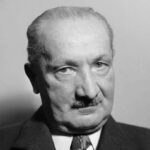
Georg Wilhelm Friedrich Hegel (1770–1831) was a German philosopher who profoundly influenced Western thought. His work traversed a wide range of subjects, including philosophy, history, politics, and society. Hegel is best known for his development of dialectical reasoning and absolute idealism, which have had a lasting impact on various intellectual domains. This article provides an in-depth exploration of Hegel’s life, his philosophical system, and his enduring influence on modern thought.
Early Life and Education
Born on August 27, 1770, in Stuttgart, Württemberg, Hegel’s early life and education played a pivotal role in shaping his philosophical ideas, which later evolved into German idealism. This article delves into the foundational years of Hegel’s life, offering insights into how his upbringing and education contributed to the development of his philosophical thought.
Hegel was born into a world of tumultuous changes. The late 18th century was a period marked by the Enlightenment and the nascent stages of the Industrial Revolution. His father, Georg Ludwig Hegel, was a government official, while his mother, Maria Magdalena Louisa, came from a family of lawyers. This background provided Hegel with a stable and intellectually stimulating environment, crucial for his early development.
The young Hegel displayed a passion for learning from an early age. His early education was at the Stuttgart Gymnasium, where he received a classical education. This period was instrumental in instilling in Hegel a love for ancient Greek and Roman literature, philosophy, and history. The teachings of figures like Aristotle and Plato during these formative years left a lasting impression on him.
Studies at the Tübinger Stift
In 1788, Hegel began his theological studies at the Tübinger Stift, a seminary attached to the University of Tübingen. It was here that Hegel’s intellectual horizons broadened significantly. He immersed himself in the works of contemporary philosophers, including Immanuel Kant and Jean-Jacques Rousseau, while also developing a keen interest in the political and social upheavals of his time, particularly the French Revolution.
Hegel’s time at Tübingen was also notable for the friendships he formed with future philosophical luminaries such as Friedrich Hölderlin and Friedrich Wilhelm Joseph Schelling. These relationships were crucial in fostering a dynamic intellectual environment, encouraging Hegel to question and refine his thoughts.
Hegel’s Philosophical Journey
- Phenomenology of Spirit (1807): This work is often considered Hegel’s magnum opus. It presents a complex method of philosophical inquiry, aimed at understanding the development of human consciousness and self-awareness. The book traverses a historical journey, from basic sensory experience to absolute knowing.
- Hegelian Dialectic: Central to Hegel’s philosophy is the dialectic process, comprising thesis, antithesis, and synthesis. This method underpins his approach to understanding historical, social, and philosophical development. It suggests that contradictions are inherent in human thought and are resolved through a process of synthesis.
- Absolute Idealism: Hegel’s system is often termed ‘absolute idealism,’ which posits that reality is a manifestation of an absolute spirit or Geist. This view merges God, nature, and spirit into a singular, dynamic, and rational whole, emphasizing the evolution of consciousness and rationality.
- Ethics and Political Philosophy: In his works “Elements of the Philosophy of Right” and “Science of Logic,” Hegel explores ethical life (Sittlichkeit) and the state’s role in the moral and spiritual development of individuals. He emphasizes the importance of community and institutions in shaping individual ethics.
Hegel’s Influence on Later Thought
- Marxism: Karl Marx was significantly influenced by Hegel. Marx’s dialectical materialism was a direct response to Hegel’s dialectical idealism, adapting Hegel’s method to his materialist views.
- Phenomenology and Existentialism: Hegel’s emphasis on consciousness influenced later philosophers like Edmund Husserl and Jean-Paul Sartre. His ideas contributed to the development of phenomenology and existentialism.
- Historicism: Hegel’s philosophy of history, which sees historical progress as the unfolding of a rational process, laid the groundwork for the historicist approach in the humanities and social sciences.
- 20th-Century Continental Philosophy: Hegelian concepts have been fundamental to various movements in 20th-century continental philosophy, including structuralism, post-structuralism, and critical theory.
Hegel’s Legacy and Criticisms
Hegel’s philosophy is best understood through its central tenets: the dialectical method, absolute idealism, and the concept of the World Spirit. The dialectical method, characterized by the triad of thesis, antithesis, and synthesis, is a dynamic process through which Hegel believed all reality and thought progress. This method was not only applied to logic but also to history, politics, and art.
In terms of absolute idealism, Hegel posited that reality is an expression of absolute spirit or Geist, unfolding through a historical process. This perspective was groundbreaking, offering a holistic view that unified the spiritual and material aspects of the world.
Furthermore, Hegel’s concept of the World Spirit suggests a direction and purpose in history, where human societies evolve towards ever-greater freedom and self-awareness. His Philosophy of Right and Philosophy of History elaborated these ideas, significantly influencing later philosophical, political, and social thought.
Hegel’s legacy is vast, influencing a range of disciplines from philosophy to political theory, history, and theology. His ideas contributed to the development of Marxist theory, existentialism, and the Frankfurt School. Hegel’s method of dialectical thinking inspired Karl Marx’s dialectical materialism, fundamentally shaping socialist thought.
Moreover, in the field of phenomenology and existentialism, thinkers like Martin Heidegger and Jean-Paul Sartre engaged deeply with Hegelian concepts. His influence is also evident in the works of later philosophers like Jürgen Habermas and in various movements in modern theology.
Criticisms of Hegel’s Philosophy
Despite his influence, Hegel’s philosophy has faced significant criticisms. One major critique is the perceived obscurity and complexity of his prose, which many argue makes his ideas inaccessible. His notion of an absolute spirit or ultimate reality has been seen by some as metaphysically speculative and lacking empirical grounding.
Critics also argue that Hegel’s philosophy can be interpreted as justifying authoritarianism or totalitarianism, given its emphasis on the state as the embodiment of ethical life. Furthermore, his teleological view of history, with its implication of an inevitable progress towards freedom, has been criticized for being overly deterministic and Eurocentric.
- Complexity and Ambiguity: Critics often point to the complexity and perceived obscurity of Hegel’s writing. His dense and elaborate prose has made his ideas challenging to interpret and apply.
- Historical Determinism: Some have critiqued Hegel’s view of history as deterministic, arguing that it understates the role of individual agency and contingency.
- Influence on Totalitarianism: Hegel’s ideas on the state and its role in ethical life have been controversially associated with justifying authoritarian regimes, though this interpretation remains debated among scholars.
Georg Wilhelm Friedrich Hegel’s contributions to philosophy cannot be overstated. His dialectical method, absolute idealism, and insights into the nature of reality, consciousness, and history continue to influence a wide array of disciplines. While complex and sometimes controversial, Hegel’s work offers profound insights into the human condition and our understanding of the world.
Related articles:
How German Philosophy Shaped the Modern World
Friedrich Wilhelm Nietzsche
Arthur Schopenhauer
Gottfried Wilhelm Leibniz: A Pioneering Polymath of the 17th Century
Exploring the Depths of German Philosophy
Immanuel Kant







